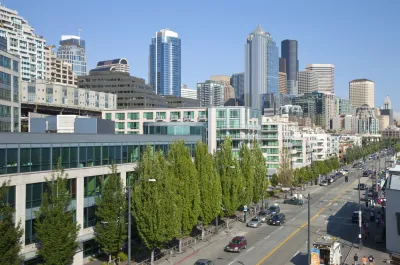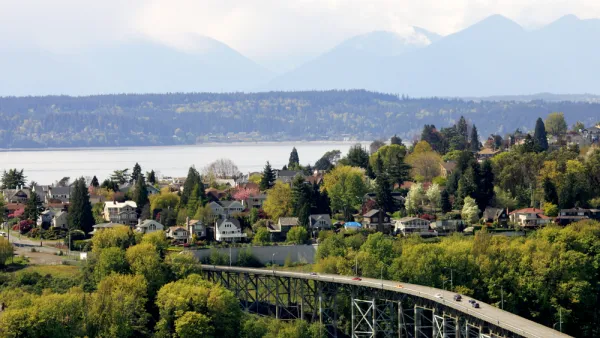Seattle is one of the U.S. cities shrinking minimum parking requirements to allow for denser, more affordable development near transit.

An oversupply of parking in U.S. cities has grave unintended consequences, directly leading to "higher housing costs, inefficient land uses, and more vehicle ownership and driving. As such, oversupplying parking harms the environment, reduces housing affordability, and thwarts efforts to improve social equity," C.J. Gabbe, Gregory Pierce, and Gordon Clowers say.
The writers explain a case study in Seattle, where after parking minimums were reduced in 2012, the city was seemingly able to increase housing development projects and encourage modes of transportation other than the automobile. The minimum requirement reduction, in line with the city's comprehensive plan, eliminated on-street parking for multifamily housing in dense urban areas, and dramatically decreased minimums for areas in close proximity to transit options.
Gabbe, Pierce, and Clowers conducted research to determine if developers built less parking in the areas with reduced requirements. Studying 60,361 housing units between 2012 and 2017, the researchers found that developers did, in fact, build less parking when requirements were reduced.
"About two-thirds of the projects we examined — mainly those in the downtown and its densest surrounding urban centers — were not required to provide any off-street parking. Most buildings in our sample provided less than one parking space per unit, and a sizable share, nearly 20%, provided no parking at all," the team writes. "Our results show that (1) minimum parking requirements often constrain developers, and (2) reducing those requirements leads to less parking, which presumably means cost savings for developers and lower housing prices for consumers."
When developers are forced to comply with excessive parking requirements, the researchers point out, they lose out on space and funds that could be used to build commercial or residential units. According to Gabbe, Pierce, and Clowers, less parking could mean more housing, and in turn, less incentive for automobile reliance.
FULL STORY: How Developers Respond to Parking Reform

Analysis: Cybertruck Fatality Rate Far Exceeds That of Ford Pinto
The Tesla Cybertruck was recalled seven times last year.

National Parks Layoffs Will Cause Communities to Lose Billions
Thousands of essential park workers were laid off this week, just before the busy spring break season.

Retro-silient?: America’s First “Eco-burb,” The Woodlands Turns 50
A master-planned community north of Houston offers lessons on green infrastructure and resilient design, but falls short of its founder’s lofty affordability and walkability goals.

Test News Post 1
This is a summary

Analysis: Cybertruck Fatality Rate Far Exceeds That of Ford Pinto
The Tesla Cybertruck was recalled seven times last year.

Test News Headline 46
Test for the image on the front page.
Urban Design for Planners 1: Software Tools
This six-course series explores essential urban design concepts using open source software and equips planners with the tools they need to participate fully in the urban design process.
Planning for Universal Design
Learn the tools for implementing Universal Design in planning regulations.
EMC Planning Group, Inc.
Planetizen
Planetizen
Mpact (formerly Rail~Volution)
Great Falls Development Authority, Inc.
HUDs Office of Policy Development and Research
NYU Wagner Graduate School of Public Service




























